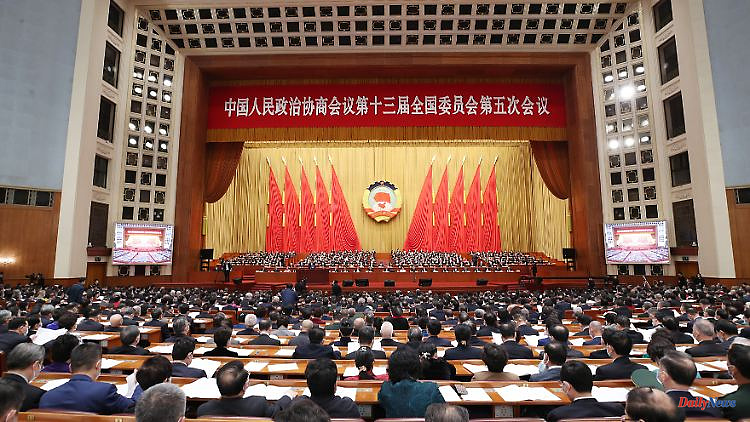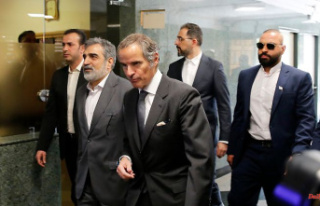The National People's Congress begins this weekend in Beijing. Against the background of increasing conflicts and problems, head of state and party leader Xi Jinping will expand his power there.
Growing international tensions, a dramatic real estate bubble and rampant youth unemployment: At the National People's Congress, which begins this Sunday in Beijing, Xi Jinping will be elected President of the People's Republic for a third term.
What's more, after his show of force at the 20th Communist Party Congress in October 2022, Xi will now be able to appoint a group of loyal followers to the government of his premier-elect Li Qiang. China's head of state is cementing his power in the midst of the current global political challenges and internal crises. Nevertheless, the first session of the 14th People's Congress marks a historical turning point in several respects.
"Hundreds of millions of people love their leader!" With these words the party magazine "Qiushi" ("Search for Truth") quoted delegates of the local People's Congress of Jiangsu Province in mid-January. Shortly before, they had voted unanimously to send state and party leader Xi Jinping as a deputy to the 14th National People's Congress. Despite the expectation of the event, the state media described the voting result as "historic": There was thunderous applause.
President Xi is one of around 3,000 delegates who will gather in the Great Hall of the People in the Chinese capital. The National People's Congress meets once a year and is considered the largest legislative assembly in the world. But the multi-day "democracy show" in Beijing is not about free elections or controversial deliberations. The deputies are not democratically elected, nor are they free in their decisions.
This year's People's Congress is a historic turning point because Xi will be the first politician since Mao to serve more than two terms as president. A corresponding limit had already been abolished by the National People's Congress in 2018 at Xi's instigation. The age of collective leadership within the party has also ended since the party congress in October at the latest. The liberal business group around ex-President Hu Jintao and former Prime Minister Li Keqiang, the so-called "Youth League faction", was coldly dismissed.
Under Hu Jintao, Xi's immediate predecessor, decisions within the party's governing body, the Standing Committee, were made by majority vote. But Xi has managed to oust all intra-party opponents. This was also symbolized by the television pictures showing Hu Jintao being escorted out of the crowded meeting room in front of cameras at the party congress in October.
It was no less than a political bang: In the run-up to the 20th party congress, there had been much speculation about the power of head of state and party leader Xi. Even experts were surprised that he was able to push through his candidates in the party against other factions with seemingly no effort. His designated Prime Minister Li Qiang, as Shanghai party leader, was responsible for the disastrous lockdown in the metropolis that lasted several months. But Li Qiang was once a close associate of Xi Jinping and is considered extremely loyal to his former boss. Xi was able to push through his protégé at the party congress and install him directly behind himself as "Number 2" on the Standing Committee. Now Li Qiang is to become prime minister at the National People's Congress and will lead China's government in the future. For critics, his election is a sign that ideological adequacy and loyalty to the president are more important than the candidates' qualifications.
Other personal details also show that China is not only relying on the president's loyal followers in domestic politics. Qin Gang was appointed as the new Chinese foreign minister at the end of December 2022. He is considered a hardliner, a so-called "wolf warrior", and most recently served as deputy foreign minister and as China's ambassador in Washington. Another personnel decision recently caused speculation. At the end of January it became known that Wang Huning had been commissioned by Head of State Xi to work out a new "unification strategy" for Taiwan. From Beijing's point of view, Taiwan is a breakaway Chinese province. The fact that Huning, the party's chief ideologue, a spin doctor, is to take on the issue could herald a reversal. It is questionable whether peaceful reunification will continue to be the propagated goal of the Chinese leadership and thus the preferred scenario from Beijing's perspective.
Beyond individual personnel decisions, the change in power structures with which Xi has been systematically breaking down the separation between state and party for years is interesting. To this end, he founded a network of small leadership groups and central commissions in the Communist Party, which are dedicated to different policy areas, such as economic or climate policy. Xi personally chairs most of these commissions, breaking through or undermining the formal separation between state and party that also exists in China. It is still unclear whether these parallel power structures within the Communist Party will be expanded further.
Despite his wealth of power, Xi Jinping is under domestic pressure. The Chinese economy continues to suffer from the consequences of the strict Zero Covid campaign. It is also important to defuse the domestic real estate crisis. Whether this is even possible in view of the gigantic vacancies seems more than questionable. At the same time, the USA, together with Japan and the Netherlands, recently succeeded in restricting the export of high-quality semiconductor technology to China.
In terms of foreign policy, Xi's third term in office will also be shaped by the systemic conflict with the USA, and it can be assumed that tensions around Taiwan will continue to increase. As a result, the world public will listen carefully to what growth targets the politicians at the National People's Congress will set for 2023 and whether new overtones will be heard about the conflict in the South China Sea. There is no question: China's future government is heading towards uncertain times.
Johann Fuhrmann is head of the Konrad Adenauer Foundation's China office based in Beijing.












